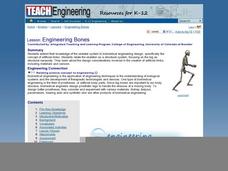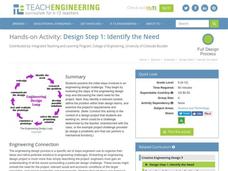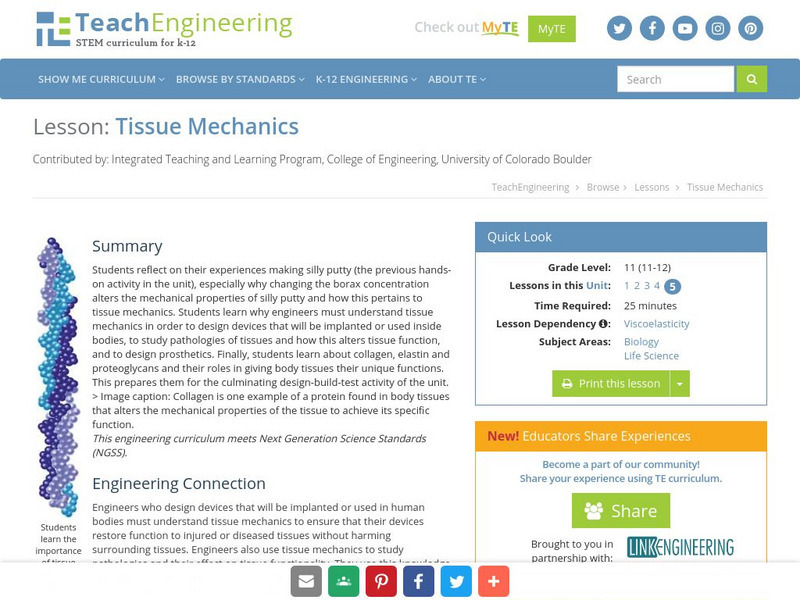Curated OER
Prosthetic Limbs
Pupils create a simple model of the muscles in hand opening and closing the it. They make the model move a block in a specified direction.
Community Resources for Science
Spring Mechanics
Scholars practice calculating spring constants before performing hands-on experiments. They compare data for parallel and series springs. Finally, they learn how spring mechanics find applications in biotechnology, such as prosthetic limbs.
Institute of Electrical and Electronics Engineers
Adaptive Device Design
After reading about how engineering has made adaptive devices possible for people with disabilities, pupils work in groups to discuss different devices to determine whether or not they are adaptive. They also disassemble a pair of...
Curated OER
Engineering Bones
Pupils identify the features of a prosthetic limb and explain how engineers are involved in the prosthetic design. For this bone engineering lesson students describe the design criteria that goes into choosing the materials that go...
Curated OER
No Valve in Vain
Students design and create their own heart valves out of a variety of materials. Their heart valves are one way valves designed for water flowing through a tube representing blood moving through the heart.
Teach Engineering
Tissue Mechanics
Engage your class by showing them how silly putty and human tissues are alike. Pupils learn more about tissue mechanics by reflecting upon their experiences with silly putty. The lesson covers collagen, elastin, and...
Curated OER
Strong as the Weakest Link
Young scholars recognize that compression and tension forces are important considerations in building structures. They construct their own building structure using marshmellows and spaghetti to see which structure can hold the most weight.
Teach Engineering
Design Step 1: Identify the Need
What exactly does an engineer do? Learners find out through a instructional activity that asks them to solve a problem that affects a target population. Aspiring engineers learn the steps of the engineering design process...
Teach Engineering
Design Step 2: Research the Problem
How do you get started designing a product to meet your engineering design goals? Here, learners gain understanding of an important aspect of the engineering design process: background research. Through brainstorming and worksheets,...
Curated OER
Innovations in Surgery and Reproductive Health
Students examine significant innovations in surgery and reproductive health. In this surgery instructional activity students view a video and answer the given questions.
Curated OER
Digestion Simulation
Students study the human digestion system and the functions of the stomach and small intestines. In this digestion instructional activity students view a demonstration on the process.
Curated OER
Medical Instrumentation
Students analyze how medical devices that help the human body function. They work in pairs or groups to draw multiple views of the medical device and describe how engineering is used by biomedial engineers.
Curated OER
Muscles, Oh My!
Pupils explore the human muscular system. For this science lesson, students discuss how engineering is related to the field of bio-mechanics and human movement.
Curated OER
Science: Put Your Heart into Engineering
Students examine the heart and vascular system and the need for artificial valves. After explaining how heart valves function, they design their own heart valves for experimentation. They predict the speed of fluid flowing through...
TeachEngineering
Teach Engineering: Tissue Mechanics
Students reflect on their experiences making silly putty (the previous hands-on activity in the unit), especially why changing the borax concentration alters the mechanical properties of silly putty and how this pertains to tissue...
















